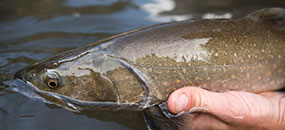For Immediate Release
June 29, 2018
Contact: Steve Moyer, smoyer@tu.org, (571) 274-0593
Laura Ziemer, lziemer@tu.org, (406) 599-2606
Corey Fisher, cfisher@tu.org, (406) 546-2979
Trout Unlimited lauds conservation elements in Senate Farm Bill
June 29, 2018 (Washington, D.C.)— The U.S. Senate passed the 2018 Farm Bill this week, with sound leadership displayed by Senate Agriculture Committee Chairman Pat Roberts and Ranking Member Debbie Stabenow in developing a bipartisan Farm Bill with strong conservation funding. With the House Farm Bill passed last week, reconciliation must occur before the September 30th deadline for reauthorization.
Trout Unlimited praised several features of the new bill.
“First and foremost, it preserves current levels of funding for the Farm Bill’s conservation programs—a significant plus for fish and wildlife, especially with mandatory spending for wildlife habitat projects in the Environmental Quality Incentives Program (EQIP), increased from 5 percent to 10 percent,” said Steve Moyer, vice president of government affairs for Trout Unlimited. “Trout Unlimited’s mission is to protect, restore and conserve trout and salmon fisheries and the watersheds on which they depend. In service to the mission, Trout Unlimited has substantially expanded its partnership work with farmers and ranchers over the past 15 years. Farm Bill conservation programs are key to the success of that collaborative work."
The Senate bill makes changes to expand, strengthen, and improve the Regional Conservation Partnership Program (RCPP), an innovative approach to conservation first authorized in the 2014 Farm Bill.
“Under RCPP, Trout Unlimited has partnered with producers from New Hampshire and West Virginia in the east, Iowa and Wisconsin in the Midwest, Idaho, Colorado and Utah in the Rockies, and to the Klamath and Upper Columbia in Oregon and Washington, to improve agricultural operations and stream health, putting millions of Farm Bill dollars to the ground efficiently and with broad benefits,” said Laura Ziemer, senior water policy adviser for Trout Unlimited.
Some of the specific ways the Senate bill improves the RCPP includes authorizing a pilot grant program that cuts red tape for conservation activities involving multiple producers at a watershed scale, such as irrigation infrastructure projects, and allowing the agency to waive a requirement for a Farm Bill-specific watershed plan under the Watershed Act, PL-566, if it is duplicative of other plans.
“Partnerships with ranchers and farmers to improve large-scale irrigation systems not only make irrigation water supplies more secure, but they also conserve water and make rivers healthier—a benefit to everyone downstream,” added Ziemer. “It’s encouraging that the Senate bill reflects the importance of continuing and expanding these partnerships that invest in water security in the West.”
Other provisions of the Senate Farm Bill are targeted at increasing the pace and scale of restoration on our National Forests and protecting America’s public lands.
“We are pleased to see several measures that will help conserve public land fish and wildlife habitat and hunting and angling opportunities,” said Corey Fisher, public land policy director for Trout Unlimited. “We need more stakeholder involvement and partnership building to gain broad support for critical forest management decisions, and the Senate bill does a good job of enhancing collaborative management of our public lands.”
The forestry title builds on America’s public land heritage in several ways:
- Proposals from both sides of the aisle to expand the National Wilderness Preservation System in Tennessee and Virginia.
- Reauthorization and increased funding for the Collaborative Forest Landscape Restoration Program.
- Bi-partisan measures that will help to restore sage grouse and mule deer habitat.
- Provisions to foster watershed protection and restoration efforts.
- Prioritizing funding for forest restoration in the wildland urban interface where projects will do the most good to mitigate the risk of uncharacteristic wildfire.
The bill achieved strong support in the Senate Agricultural Committee, noted Moyer.
“We commend the savvy leadership of Senators Roberts and Stabenow in shepherding the bill through the Committee, and we thank members for their support of the bill.”
# # #
Trout Unlimited is the nation’s oldest and largest coldwater fisheries conservation organization dedicated to conserving, protecting and restoring North America’s trout and salmon and their watersheds. Follow TU on Facebook and Twitter, and follow our blog for all the latest information on trout and salmon conservation.



